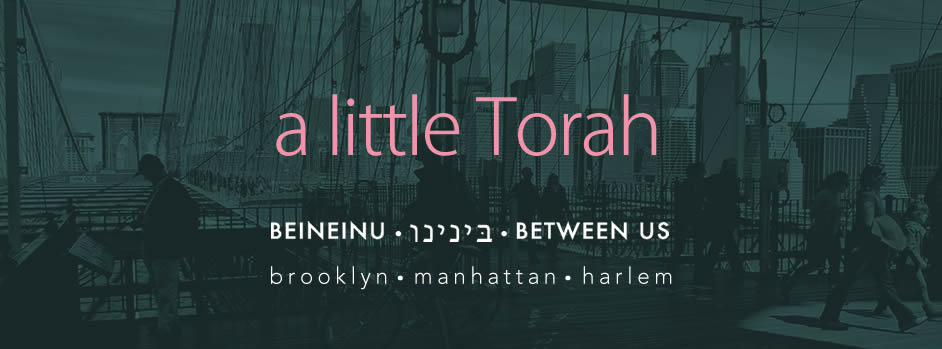IF you don't have time to read the message
at least
scroll down
to see
the wonderful
Shabbat gatherings
coming up
in April and May
from Harlem to Dumbo
Wishing you and your loved ones a meaningful seder and a good holiday.
May you let go of your personal "chametz" (all that weighs you down) so you can continue to move through life with compassion and grace.
It continues to be a privilege and a pleasure to be on this journey with you.
In blessing and friendship,
Laurie and Daphna
Most people, REGARDLESS of the label we assign or don't assign to ourselves; Jewish, connected to a Jewish household, religious, non-practicing, athiest, socialist, Reform, cultural, Conservative, human being and the list goes on, we will attend a Passover seder. Hundreds of thousands of people (could be an "alternative fact" but it's good for my case 😊) have already entered "date, time and location" of the seder they will be attending. Some will be hosting, wondering if there will be enough food and enough room at the table. Others will be hosted, bearing gifts and wondering who else is coming. The evening will begin with hugs and an exchange of pleasantries; "Hello darling!" "How are you sweetheart?" "What's up handsome?" and once all of the guests have arrived everyone will find their place at the table and the seder will begin.
REGARDLESS of the length of our seder, we will rotate around the table sharing the story of the Exodus from Egypt. REGARDLESS of the language we read, we will retell how the Israelites went from slaveryt to freedom. We will drink wine, dip bitter herbs and eat matzah. REGARDLESS if the meal is vegetarian, vegan or filled with beef and chicken, We will sing and exchange stories.
Passover is the holiday that connects us REGARDLESS of everything that creates a divide. Passover highlights the most imporant aspect of our existence; we are all human. We were all born and we are all living and we will all eventually die. How we choose to spend our time in life, is up to us. The story of the Exodus does not contain Jews. It is the story of the Israelites - "Yisrael", the ones who wrestle with "El" (with God). Passover is our opportunity to commit to the wrestling for another year. IT is the story about human beings moving from slavery to freedom in body, mind and soul. Passover is our opportunity to claim (and reclaim) our path towards a full freedom for ourselves and for others.
The Haggadah ends with "Next year in Jersalem." The author ends on a note of hope and aspiration. The author ends with the place he/she/they want to be most. Jerusalem can be the city itself. It can also represent the place where the true lessons of Passover are fully realized. "Jerusalem" is the place "where all who are hungry" CAN eat. "Jerusalem" is the place where the other is welcome. "Jerusalem" is the place where we love the other as our friend. "Jerusalem" is also the place where we love ourselves and where we embrace our full self.
REGARDLESS of how we label or don't label ourselves we are all human. We can each do something to honor and demonstrate gratitude for our freedom. We should all do something for the other and for ourselves to honor and demonstrate gratitude for our freedom. Make the list and choose.
We will attend the seder and do all the "sedery" things. But, let's make a pledge to continue the teaching of the seder until Passover 2018. Let's each make a commitment to honor the fact that we are all human. Let's wrestle!
Passover is the holiday that connects us REGARDLESS of everything that creates a divide. Passover highlights the most imporant aspect of our existence; we are all human. We were all born and we are all living and we will all eventually die. How we choose to spend our time in life, is up to us. The story of the Exodus does not contain Jews. It is the story of the Israelites - "Yisrael", the ones who wrestle with "El" (with God). Passover is our opportunity to commit to the wrestling for another year. IT is the story about human beings moving from slavery to freedom in body, mind and soul. Passover is our opportunity to claim (and reclaim) our path towards a full freedom for ourselves and for others.
The Haggadah ends with "Next year in Jersalem." The author ends on a note of hope and aspiration. The author ends with the place he/she/they want to be most. Jerusalem can be the city itself. It can also represent the place where the true lessons of Passover are fully realized. "Jerusalem" is the place "where all who are hungry" CAN eat. "Jerusalem" is the place where the other is welcome. "Jerusalem" is the place where we love the other as our friend. "Jerusalem" is also the place where we love ourselves and where we embrace our full self.
REGARDLESS of how we label or don't label ourselves we are all human. We can each do something to honor and demonstrate gratitude for our freedom. We should all do something for the other and for ourselves to honor and demonstrate gratitude for our freedom. Make the list and choose.
We will attend the seder and do all the "sedery" things. But, let's make a pledge to continue the teaching of the seder until Passover 2018. Let's each make a commitment to honor the fact that we are all human. Let's wrestle!

